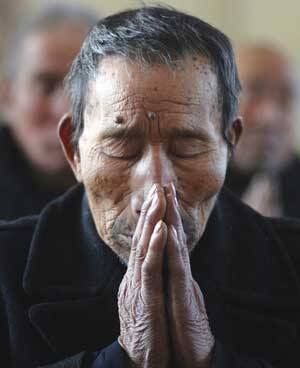The Vatican has published a new commentary on Pope Benedict XVI’s 2007 pastoral letter to Chinese Catholics that encourages the faithful to begin a process of spiritual reconciliation even before “a structural merger of official and unofficial Catholic communities can take place.”
The 2007 letter contained directives for bridging the gap between those Catholic communities that have registered with the Chinese authorities and operate under state restrictions, and those Catholic communities that have operated in a more clandestine fashion, allowing them to profess full fidelity to the Roman church. While the 2007 letter strongly criticized the limits placed on the church’s activities, it invited a new and serious dialogue with the government on several key issues, including the appointment of bishops. The new commentary, which was released on May 24, is intended to address questions that have arisen since 2007.
In addition to praying for one another, Catholics in China must take concrete steps, including sharing pastoral projects and undertaking common initiatives, according to the new document. “It is by means of practical steps that spiritual reconciliation, including visible reconciliation, will gradually occur, which will culminate one day in the complete structural unity,” the Vatican wrote. While reconciliation is a journey that will not be concluded overnight, the necessary steps cannot “be postponed because—or on the pretext that—they are difficult since they require the overcoming of personal positions or views.”
The new document also reaffirmed Pope Benedict’s insistence that some aspects of the state-approved church, the Chinese Catholic Patriotic Association, “cannot be reconciled with Catholic doctrine,” particularly its claim to have authority over individual bishops in guiding the Catholic community as well as its professed independence from the Vatican. At the same time the new document, like the 2007 letter, said that registration with the government is acceptable as long as it does not compromise principles of the faith and church communion and as long as it does not force church leaders to perform actions contrary to their consciences.
The commentary re-emphasized the pope’s position that determining whether or not to cooperate with the government is a decision that must be made by the local bishop in consultation with his priests, since government officials in different parts of China place different conditions on local bishops. “The pope neither excludes the possibility of accepting or seeking government recognition nor encourages doing so; the ideal would be to abandon the clandestine condition, but everything depends on the constraints imposed,” it said.
The new document also stated that individual Catholics have wide latitude in deciding whether or not to receive the sacraments from bishops and priests who are recognized by the government but have not requested recognition from the Holy See. “If the bishop or the priest celebrant is in communion with the pope, the faithful ‘should not hesitate’ to receive the sacraments from him,” it said. If Catholics cannot find pastors in communion with the pope and if they feel they need the sacraments at that moment for their spiritual good, the final decision on whether or not to receive them is up to the individual.








